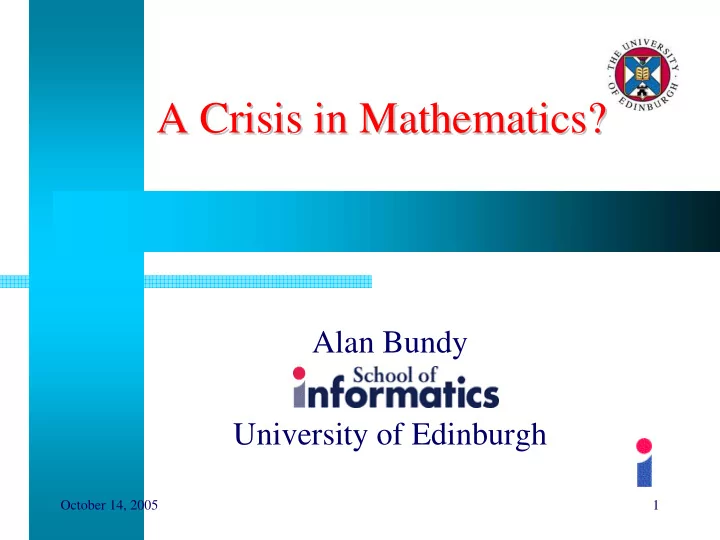

A Crisis in Mathematics? A Crisis in Mathematics? Alan Bundy University of Edinburgh October 14, 2005 1
Mathematical Proofs Mathematical Proofs � Ideal; short, simple and elegant. � Social process: – understanding of argument; – community agreement. � Formalization informal. � Tolerance of non-fatal error. However, there are now pressures for change. October 14, 2005 2
Inevitability of Enormous Proofs Inevitability of Enormous Proofs � Turing proved predicate calculus provability undecidable. – i.e. no algorithm to determine provability. – Nearly all areas of maths undecidable. � Therefore, no limit to size of proofs of some simple theorems. – Otherwise, an algorithm could enumerate all candidate proofs. – Thereby guarantee to generate proof of conjecture, if it exists. October 14, 2005 3
Enormous Proofs Actually Occur Enormous Proofs Actually Occur � Several examples in last half century: – classification of finite simple groups; – four colour theorem; – Kepler’s conjecture. � Essential use of computers. � Proofs not human understandable. � Highly controversial. October 14, 2005 4
The Dilemma The Dilemma � Insist that proofs are human understandable. – accept that some simple theorems are forever unprovable. � Accept computer-generated proofs. – abandon the traditional ‘social process’ in some cases. October 14, 2005 5
Classification of Finite, Simple Groups Classification of Finite, Simple Groups � “10,000 pages in hundreds of papers” (Aschbacher’s estimate). � “The probability of error is one” (Aschbacher). � Use of computers to prove existence and/or uniqueness of sporadic groups. – Now mostly eliminated. – Why is such elimination considered a Good Thing? October 14, 2005 6
Four Colour Theorem Four Colour Theorem Can we colour any map with no more than four colours? � Long history of erroneous proofs. � Appel and Haken 1976 proof used computer to analyse 1,936 cases. � Many mathematicians reject proof. October 14, 2005 7
Kepler’ ’s Conjecture s Conjecture Kepler What is the most efficient way to pack spheres? � Hales 1998 computer-assisted proof of 4- century old conjecture. � Annals of Mathematics 12-person referee team fail to verify computer part. – Published with disclaimer. October 14, 2005 8
Objections to Computer Proof Objections to Computer Proof � Cannot be sure of correctness. – Programs notoriously buggy. � May be impossible to understand. – Thousands of cases. – “Thus proofs are …. a vehicle for arriving at a deeper understanding of mathematical reality” (Aschbacher). – “Social process” denied. October 14, 2005 9
Computer Algebra Systems Computer Algebra Systems � Started in 1960s with symbolic integration systems. – Since expanded to algebra, matrices, groups, ….. � Many popular systems: Maple, Mathematica, GAP. – Widely used and taught in mathematics. – Nearly all known to be unsound. � Used, for instance, in classification of finite simple groups. – Experimental mathematics – “Death of Proof” (Horgan). October 14, 2005 10
Automated Theorem Provers Automated Theorem Provers � Based on work in logic. – e.g. Frege, Hilbert, Herbrand, Gentzen,… � Manipulation of formulae by valid rules. – “LCF” style guarantees correctness. • Rule application core small and verifiable. • Proof object can be 3 rd party checked. � Both automated and interactive. – Many mature systems: Isabelle, PVS, Coq, … – Usage highly skilled and time-consuming. � Not widely used by mathematicians. – But see later … October 14, 2005 11
Error Detection by ATP Error Detection by ATP � Fleuriot’s Isabelle proof of Newton’s proof of Kepler’s Laws of planetary motion. – Formalization of infinitesimals. – Error undiscovered for 3 centuries. • ε 2 ~ ε → ε ~1 --- detected and corrected. � Meikle’s formalization of Hilbert’s Grundlagen der Geometrie. – Appeal to geometric intuition despite intention not to. – Hilbert’s original intention now realised. October 14, 2005 12
Gonthier’ ’s ATP Proof of 4CT s ATP Proof of 4CT Gonthier � Coq proof of four colour theorem. � LCF style guarantees correctness. � Proof still consists of many cases. � Proof still hard to understand. October 14, 2005 13
Hale’ ’s s FlysPecK FlysPecK project project Hale � Formal Proof of the Kepler’s conjecture using ATP. – Reaction to Annals’ decision. � Computer proof with correctness guarantee. � Widespread engagement of ATP community. – HOL-Light, Coq, Isabelle, … (Babel problem?) – http://www.math.pitt.edu/~thales/flyspeck/ � Hales’ estimate 20 person-years. � Initial success: Jordan Curve Theorem. – Proof not easy to understand. October 14, 2005 14
Are Computers Necessary? Are Computers Necessary? � Classification of finite simple groups largely human executed. – Use of CAS largely eliminated. � Probability of error high. – p=1 says Aschbacher. � No human understands in detail. – No published outline. � So problems similar to computer proofs. October 14, 2005 15
Can ATP Solve the Problems? Can ATP Solve the Problems? � LCF style guarantees correctness. – But mathematicians tolerant of non-fatal error. � Computer proofs typically inaccessible. – Understandability very important to mathematicians. � Can computers aid understanding of large proofs? – We look at proof plans. October 14, 2005 16
Proof Planning Proof Planning � LCF tactics guide application of logical rules. � Proof methods specify tactics to explain how and why they fit together. � Proof critics anticipate and patch proof failures. � Hiproofs provide picture of proof structure. October 14, 2005 17
Proof Plan for Induction Proof Plan for Induction Induction Strategy Induction Base Step Ripple Symbolic Wave Evaluation Fertilization October 14, 2005 18
Plan for n- -Bit Multiplier Bit Multiplier Plan for n Ind strat Ind strat Sym eval Ind strat Ind strat Ind strat Sym eval Ind strat Ind strat October 14, 2005 19
Conclusion Conclusion � Large proofs of simple theorems are inevitable. – Either cope with this or abandon large tracts of mathematics. � Computers have helped produce such large proofs. � Computers can ensure correctness of large proofs. � Can computers make large proofs more accessible ? October 14, 2005 20
Recommend
More recommend